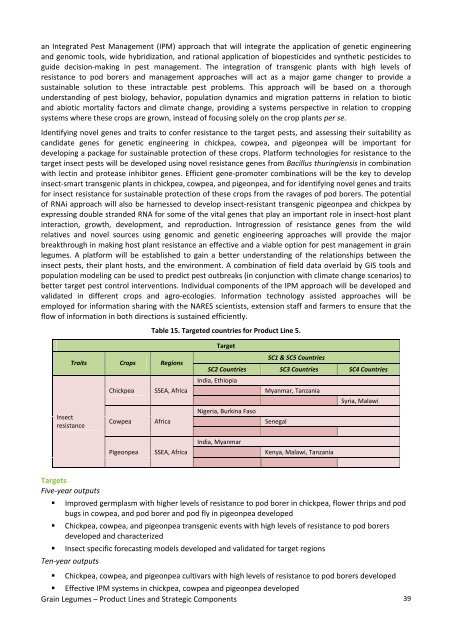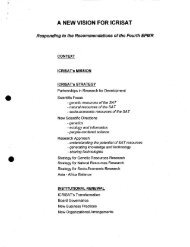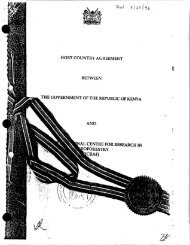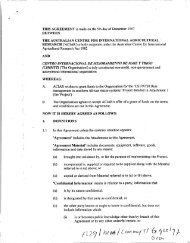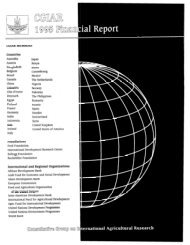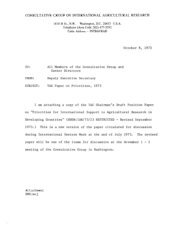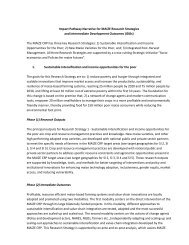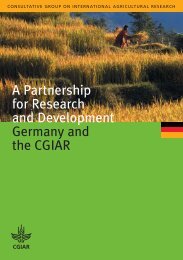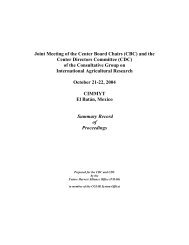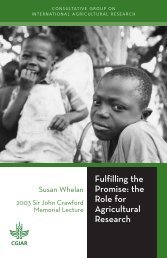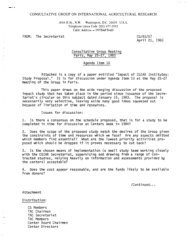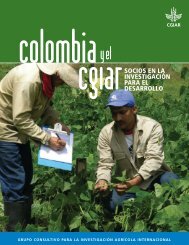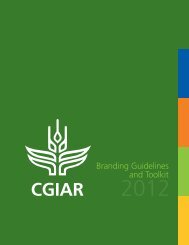CGIAR Research Program on Grain Legumes: Proposal - Library
CGIAR Research Program on Grain Legumes: Proposal - Library
CGIAR Research Program on Grain Legumes: Proposal - Library
- No tags were found...
You also want an ePaper? Increase the reach of your titles
YUMPU automatically turns print PDFs into web optimized ePapers that Google loves.
an Integrated Pest Management (IPM) approach that will integrate the applicati<strong>on</strong> of genetic engineeringand genomic tools, wide hybridizati<strong>on</strong>, and rati<strong>on</strong>al applicati<strong>on</strong> of biopesticides and synthetic pesticides toguide decisi<strong>on</strong>-making in pest management. The integrati<strong>on</strong> of transgenic plants with high levels ofresistance to pod borers and management approaches will act as a major game changer to provide asustainable soluti<strong>on</strong> to these intractable pest problems. This approach will be based <strong>on</strong> a thoroughunderstanding of pest biology, behavior, populati<strong>on</strong> dynamics and migrati<strong>on</strong> patterns in relati<strong>on</strong> to bioticand abiotic mortality factors and climate change, providing a systems perspective in relati<strong>on</strong> to croppingsystems where these crops are grown, instead of focusing solely <strong>on</strong> the crop plants per se.Identifying novel genes and traits to c<strong>on</strong>fer resistance to the target pests, and assessing their suitability ascandidate genes for genetic engineering in chickpea, cowpea, and pige<strong>on</strong>pea will be important fordeveloping a package for sustainable protecti<strong>on</strong> of these crops. Platform technologies for resistance to thetarget insect pests will be developed using novel resistance genes from Bacillus thuringiensis in combinati<strong>on</strong>with lectin and protease inhibitor genes. Efficient gene-promoter combinati<strong>on</strong>s will be the key to developinsect-smart transgenic plants in chickpea, cowpea, and pige<strong>on</strong>pea, and for identifying novel genes and traitsfor insect resistance for sustainable protecti<strong>on</strong> of these crops from the ravages of pod borers. The potentialof RNAi approach will also be harnessed to develop insect-resistant transgenic pige<strong>on</strong>pea and chickpea byexpressing double stranded RNA for some of the vital genes that play an important role in insect-host plantinteracti<strong>on</strong>, growth, development, and reproducti<strong>on</strong>. Introgressi<strong>on</strong> of resistance genes from the wildrelatives and novel sources using genomic and genetic engineering approaches will provide the majorbreakthrough in making host plant resistance an effective and a viable opti<strong>on</strong> for pest management in grainlegumes. A platform will be established to gain a better understanding of the relati<strong>on</strong>ships between theinsect pests, their plant hosts, and the envir<strong>on</strong>ment. A combinati<strong>on</strong> of field data overlaid by GIS tools andpopulati<strong>on</strong> modeling can be used to predict pest outbreaks (in c<strong>on</strong>juncti<strong>on</strong> with climate change scenarios) tobetter target pest c<strong>on</strong>trol interventi<strong>on</strong>s. Individual comp<strong>on</strong>ents of the IPM approach will be developed andvalidated in different crops and agro-ecologies. Informati<strong>on</strong> technology assisted approaches will beemployed for informati<strong>on</strong> sharing with the NARES scientists, extensi<strong>on</strong> staff and farmers to ensure that theflow of informati<strong>on</strong> in both directi<strong>on</strong>s is sustained efficiently.Table 15. Targeted countries for Product Line 5.InsectresistanceTraits Crops Regi<strong>on</strong>sChickpeaCowpeaSSEA, AfricaAfricaTargetSC1 & SC5 CountriesSC2 Countries SC3 Countries SC4 CountriesIndia, EthiopiaMyanmar, TanzaniaSyria, MalawiNigeria, Burkina FasoSenegalPige<strong>on</strong>peaSSEA, AfricaIndia, MyanmarKenya, Malawi, TanzaniaTargetsFive-year outputs• Improved germplasm with higher levels of resistance to pod borer in chickpea, flower thrips and podbugs in cowpea, and pod borer and pod fly in pige<strong>on</strong>pea developed• Chickpea, cowpea, and pige<strong>on</strong>pea transgenic events with high levels of resistance to pod borersdeveloped and characterized• Insect specific forecasting models developed and validated for target regi<strong>on</strong>sTen-year outputs• Chickpea, cowpea, and pige<strong>on</strong>pea cultivars with high levels of resistance to pod borers developed• Effective IPM systems in chickpea, cowpea and pige<strong>on</strong>pea developed<strong>Grain</strong> <strong>Legumes</strong> – Product Lines and Strategic Comp<strong>on</strong>ents 39


